Once upon a time, three monks doing their ascetic training were traveling by foot along the old Shikoku pilgrimage route, which runs by the sea through the four lands of Iyo, Sanuki, Awa and Tosa. In the midst of their travels, however, they some way or another became lost deep in the mountains. Not knowing which way to go, they prayed desperately that they might find their way back to the coastal path.
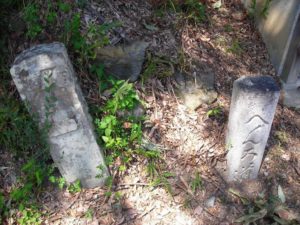
「Pilgrimage waymarks in Tokushima」(Karikari-ume, CC BY-SA 3.0 <http://creativecommons.org/licenses/by-sa/3.0/>, via Wikimedia Commons)
But despite their prayers, they eventually ended up even deeper in the mountains, in a valley seemingly untrodden by humans. Lamenting their bad luck, they pushed their way through thorns and brambles until suddenly they arrived at a flat clearing enclosed by a wooden fence.
“There must be someone living here,” the monks thought to themselves as they passed the fence, and were soon overjoyed to see a small cluster of houses in the middle of the clearing.
Even supposing it was a demon’s house, at this point, they had no choice: they were utterly lost.
So thinking, the three monks approached the house and called out, “Excuse me, is anyone home?”
A voice came from inside the house: “Who goes there?”
“We are monks. In the midst of our training we got lost and wound up here. Would you be so kind as to tell us which way to go?” They asked.
“Please wait a moment,” the voice said. After a short while, a person came out of the house.
It was a monk of sixty or so, with frightening, uncanny features. He beckoned them closer, and so, reminding themselves that they had no other recourse—whether this man turned out to be a demon or some kind of spirit—the monks steeled themselves and came up to the house. Once they had sat down on the wooden porch, the monk said, “You must be tired,” upon which he went into the house and came back out holding a neatly arranged platter of food. The monks, relieved to be in the company of a fellow human being and not a demon, thanked the man and settled down to eat.
Once the three monks had finished their meal, and were resting on the veranda, the expression of the older monk who owned the house abruptly darkened as he called out to somebody.
The monks, in spite of themselves, watched now uneasily as a suspicious-looking priest appeared from the yard. The older monk said to the priest, “Bring the usual things.” The priest went away and came back bearing a horse’s bridle and a whip in his hands.
“Do what you normally do,” the older monk ordered.
The priest then approached the veranda where the three monks were sitting, and suddenly dragged one of them off the wooden porch and into the front yard. The other two looked on in horror as the priest began whipping the monk with the horse whip. He whipped him violently 50 times.
“Help me, please!” the monk cried, but the other two were frozen in terror and felt powerless to intervene.
After the first 50 lashes, the priest stripped the monk of his robes, then whipped his naked back another 50 times, to a total of 100 lashes. After the last crack of the whip, the monk collapsed on his stomach to the ground. But just as it seemed as if he might be dead, the owner of the house said to the priest, “Lift him up.” Then the priest pulled the monk to his feet, and the two who still sat on the porch saw their friend transform before their own eyes into a horse.
The priest bridled the horse, formerly their fellow monk, and led it shivering and shuddering away from the yard.
Shocked, the monks realized that they were no longer in the human realm. Would they too share the same fate as their comrade? Too stunned to do anything but stare into empty space, they sat on the veranda until the priest returned with his whip and bridle and then proceeded to do the same thing to the second monk, who like his friend was transformed into a horse and led away by the reins.
The one monk who was left on the porch thought to himself, “The same thing will surely happen to me too,” and fell into a deep despondency. He desperately repeated a prayer in his heart—the same kind of prayer that he said to himself every single day—pleading with the Buddha to save him from this horrible fate.
After the second young monk—now a horse—had likewise been lead away by the priest, the owner of the house pointed to a certain spot and ordered the last monk, “Stay there.” And so the monk waited in that place, as he was told, until evening.
Once the sun had set, the monk began to think to himself, “If I’m going to be made into a horse like the other two, I have nothing to lose by trying to escape. Even if they catch me, won’t the result be the same?” Yet, having little knowledge of the area, he had no idea where he would go even if he were to try to run away. “In that case, maybe I should simply find some way to kill myself,” he thought. Still, he was unable to make up his mind.
After a while, the owner of the house called out to the monk from the porch.
“You see that rice field behind you?” he said.
“Yes, I see it,” the monk replied.
“Go over there and see if there is water in the field.”
Walking warily over to the rice paddy, the monk saw that there was water. He returned to the house and said to the older man, “There is water in the field.” Feeling sure that the owner of the house and the priest were planning to do something horrible to him, too, he felt a wave of dread pass through his body.
To his surprise, though, the owner of the house soon went to bed, having ordered the monk to remain in the designated place until morning.
Seeing that he might be spared for the time being, the monk finally made up his mind to escape. And so, waiting for the moment when everyone seemed to have fallen asleep, he ran as fast as he could, leaving even the box containing his sutras and other supplies, and ran in whatever direction his legs carried him.
After he had run what must have been a little less than a kilometer, the monk came upon another house. Still fearing for his life, he was about to dash past it when he saw a woman standing on the veranda, beckoning him closer.
“Who goes there?” The woman said.
Uneasily, the monk briefly explained his circumstances, saying, “I have made up mind to escape even if it means that I die out here in the wilderness. Would you be so kind as to help me?”
“I see,” the woman replied. “I’m very sorry to hear that. Well, to start with, please come inside.”
Hearing this, the monk entered the woman’s house. Once inside, the woman said to him, “I’ve seen such deplorable things happen for many years now, but unfortunately I haven’t been able to do anything about it. However, I would very much like to help you. You see, I am the wife of the man who owns the house you fled from. A little ways down from here is the house of my younger sister—it’s not far, and she is the only person who can help you in this situation. Please go there and tell her that I have sent you.”
Then the woman said, “Here, let me write you a letter that you can show to her,” and drafted a letter on a slip of paper which she gave to the monk.
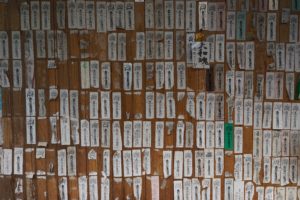
「Rest stop for pilgrims in Kochi Prefecture」(r18 INO (PACHIMO), CC BY 3.0 <https://creativecommons.org/licenses/by/3.0>, via Wikimedia Commons)
“The two men who turned your friends into horses surely intended to bury you alive. That is why they sent you to see if there was water in the rice field—because they wanted to dig a hole there and bury you in it,” the woman said.
“It was a good thing that I escaped!” the monk thought to himself, and felt certain that it had been the grace of Buddha.
Having received the letter, the monk turned to the woman and, on the verge of tears, put his hands together in a gesture of gratitude. Then, he started running in the direction that the woman had instructed him.
After he had travelled what he thought was a little over two kilometers, he came to a place where yet another house stood in the same kind of isolated valley. “This must be it,” he thought. A maid greeted him at the door, to whom he gave the woman’s letter. The maid disappeared back into the house and then returned a few moments later, telling him to come in.
In the house, a woman received him who looked to be the aforementioned younger sister.
“I too have been appalled by the things they do up there,” she said to him. “And since my sister has appealed to me directly, I feel obliged to help you. However, there is something dreadful in this house as well, and I must ask you to hide in this room for the time being,” she said leading him to a small crawlspace all the way at the back of the house.
When the monk had hidden himself in there, she turned back to him and said, “No matter what, you mustn’t make a noise. It’s already about that time…” The monk sat absolutely still and wondered anxiously what the woman meant by those words.
Before long, a terrible presence entered the house. From every which direction came wafting in a raw, putrid stench. The blood froze in the monk’s veins as he heard whatever it was enter the room next door, and could just make out the sounds of it speaking with the woman before seemingly laying down to sleep together in the bed. The monk, listening closely, heard the monster settle things with the woman and then leave the house.
The monk realized that the woman must be the wife of a demon; whenever it came to the house, it would sleep with the woman and then leave. This thought made him even more unsettled.
After the demon had left, the woman told him the directions to the nearest town, and then said to him, “It’s a good thing that you found your way here—otherwise you would surely have perished…”
The monk, with tears in his eyes once again, put his hands together and prostrated himself on the ground in gratitude. Then, he left the house and was on his way, making for the direction that the woman had indicated. He walked until daybreak—a distance of what must have been no less than ten kilometers; then, as the sky brightened in the east, the monk saw that at some point he had found his way back to the normal path. A sense of joyful relief washed over him such as he had never before felt in his life.
Soon, the monk came to a village, and going into the first house he saw there, told the people inside about the things he had seen and how he had escaped. The villagers were shocked at his story; before long, rumor spread about the monk’s travails, and people from all over the town gathered to hear him speak. The name of this town was __ Village in __ County of __ Province.
It is worth mentioning that the two women who helped him escape had given him strict orders—in return for saving his life–to never tell of his experiences in the mountains, or even of the fact that such a place existed. But the monk could not bring himself to obey these instructions: indeed, he thought, who could possibly be expected to keep such a horrible secret? With that in mind, he told every person whom he met on his way back to Kyoto his story.
As rumor spread of the monk’s story, the young able-bodied men of that province came together and gathered a small army to go up into the mountains. However, given the remoteness of the place and the dearth of information about its geography, these efforts were unsuccessful. With the knowledge that he might not be able to find his way out if he went back up there, the monk decided not to accompany the expedition. He then made a tour of several different regions before finally returning to the Capital.
Even after returning home, the monk never heard any other stories about the demon village in the mountains or where it was located. He himself could hardly believe that he had, with his very own eyes, watched his two friends be transformed into horses. He sometimes wondered whether they had accidentally wandered into a different cosmic dimension, like the so-called Realm of Beasts talked of in Buddhist scripture. Every day after that, he prayed and held services for his two fellow monks who had perished.
In our opinion, the story told above is a good example of why one should never, even in the midst of ascetic training, wander recklessly into unknown places; and such has it been passed down from generation to generation, until the present the day.
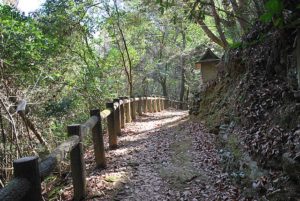
「Pilgrim’s path from Fujii-dera to Shōzan-ji, Tokushima」(Reggaeman, CC BY-SA 3.0 <https://creativecommons.org/licenses/by-sa/3.0>, via Wikimedia Commons)
[Translation]
Edward Farmer
[Explanation]
Edward Farmer
The title of this story is somewhat difficult to translate into English, as it contains the word henchi (辺地), which has two meanings in colloquial and Buddhist language: the first meaning is simply “a remote place,” whereas the second (Buddhist) meaning denotes the four intermediate levels or stages that a Buddhist practitioner travels through on their way to the Pure Land; the four old lands of Shikoku (Awa, Tosa, Iyo, Sanuki) are said to be manifestations of these four levels, i.e. Formation of Desire, Ascetic Practice, Becoming a Bodhisattva, and Nirvana.
Regarding the content of the story, this tale of the final scroll of the Konjaku Monogatarishū has a remarkably modern feeling to it, especially in the style of horror employed when the monks encounter the “older monk with terrifying features” and the “suspicious-looking priest,” which involves a subversion of authority such that somebody who should be trustworthy (like a priest) turns out to be untrustworthy or malicious. Also, the atmosphere of a remote place hidden deep in the mountains unknown to the outside world has parallels in the modern horror trope of locations such as the Appalachian Mountains in American horror movies like Deliverance. This is the kind of story that I could easily see being turned into a modern horror short film, for example. Kurosawa’s Rashōmon, based on an Akutagawa story which is in turn based on several tales from the Konjaku Monogatarishū, comes to mind.
[Cooperation]
Shinichi Kusano

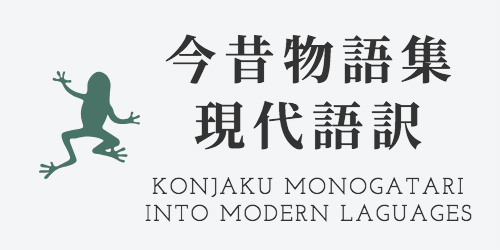
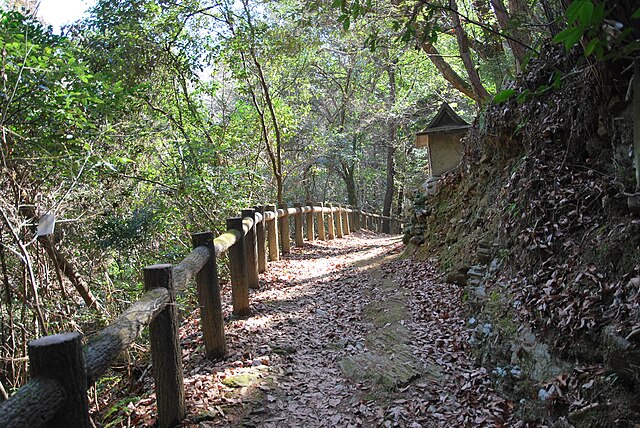
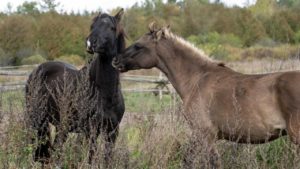
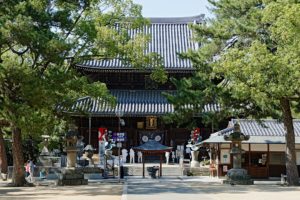
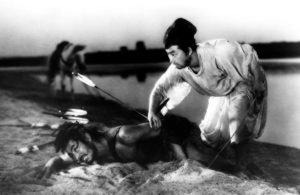





コメント